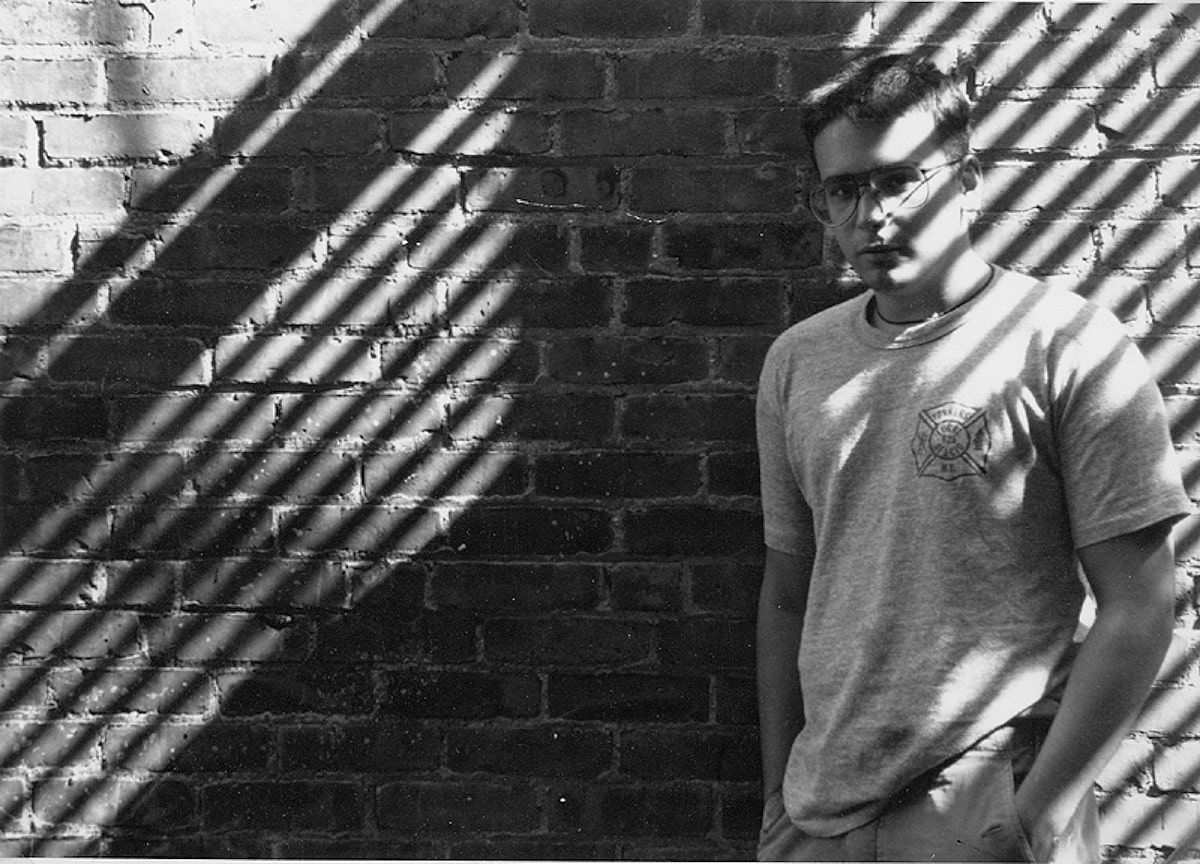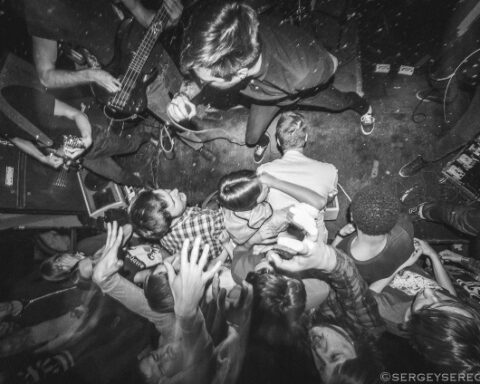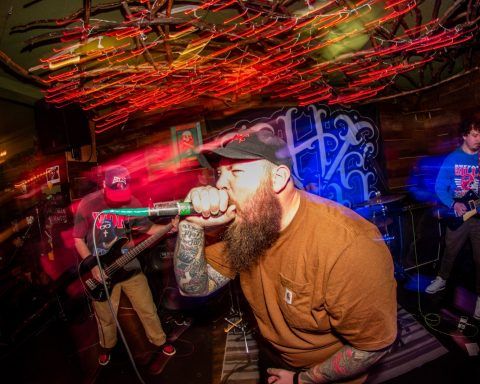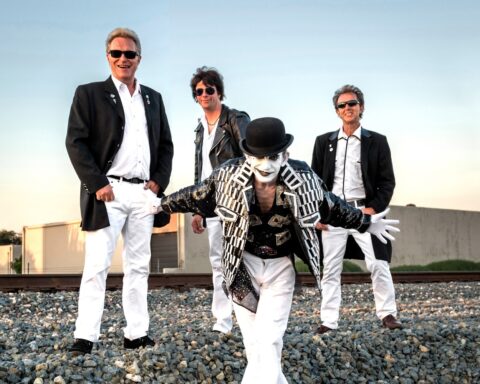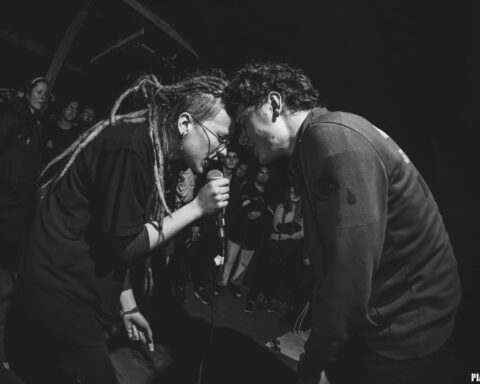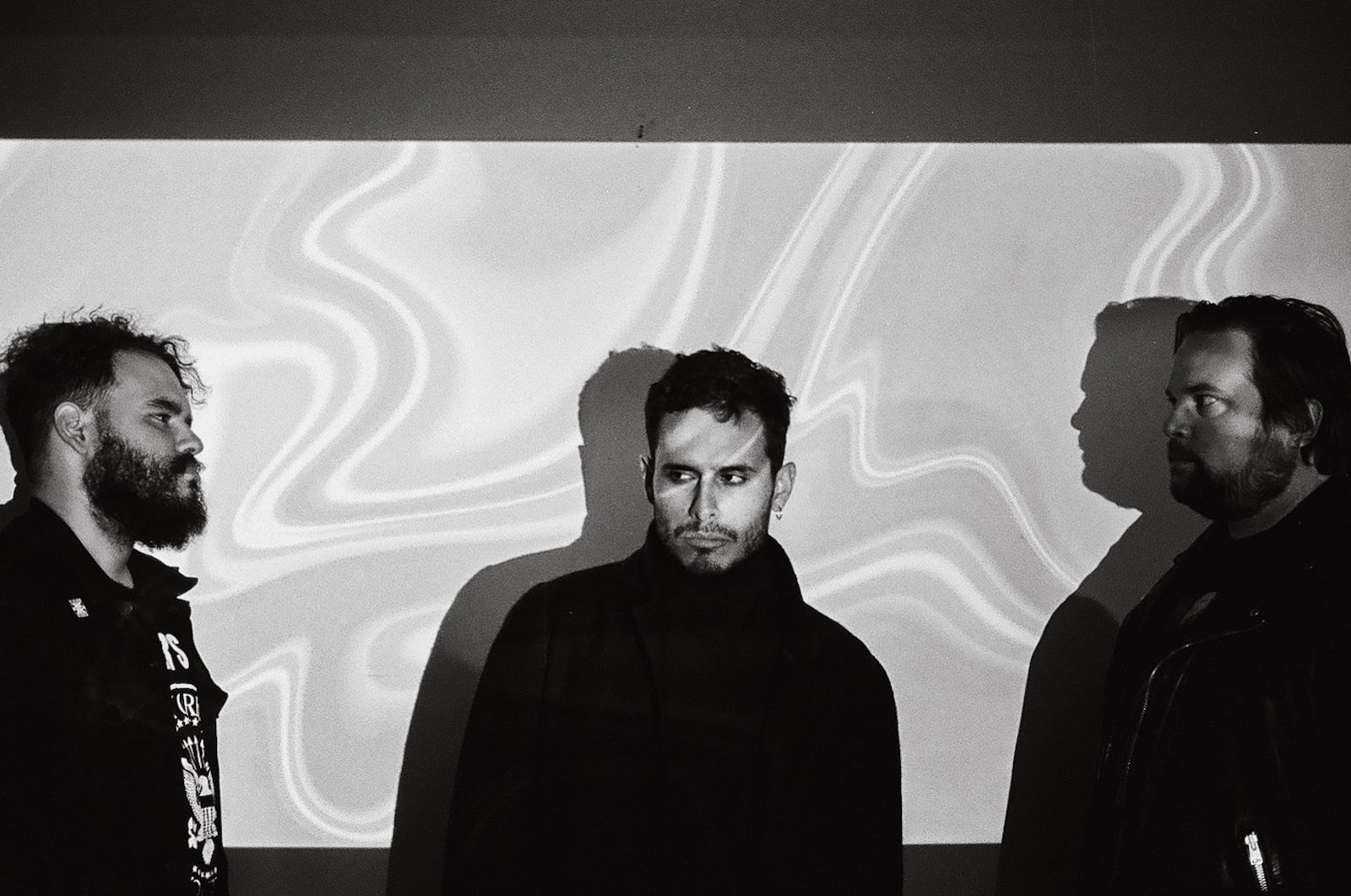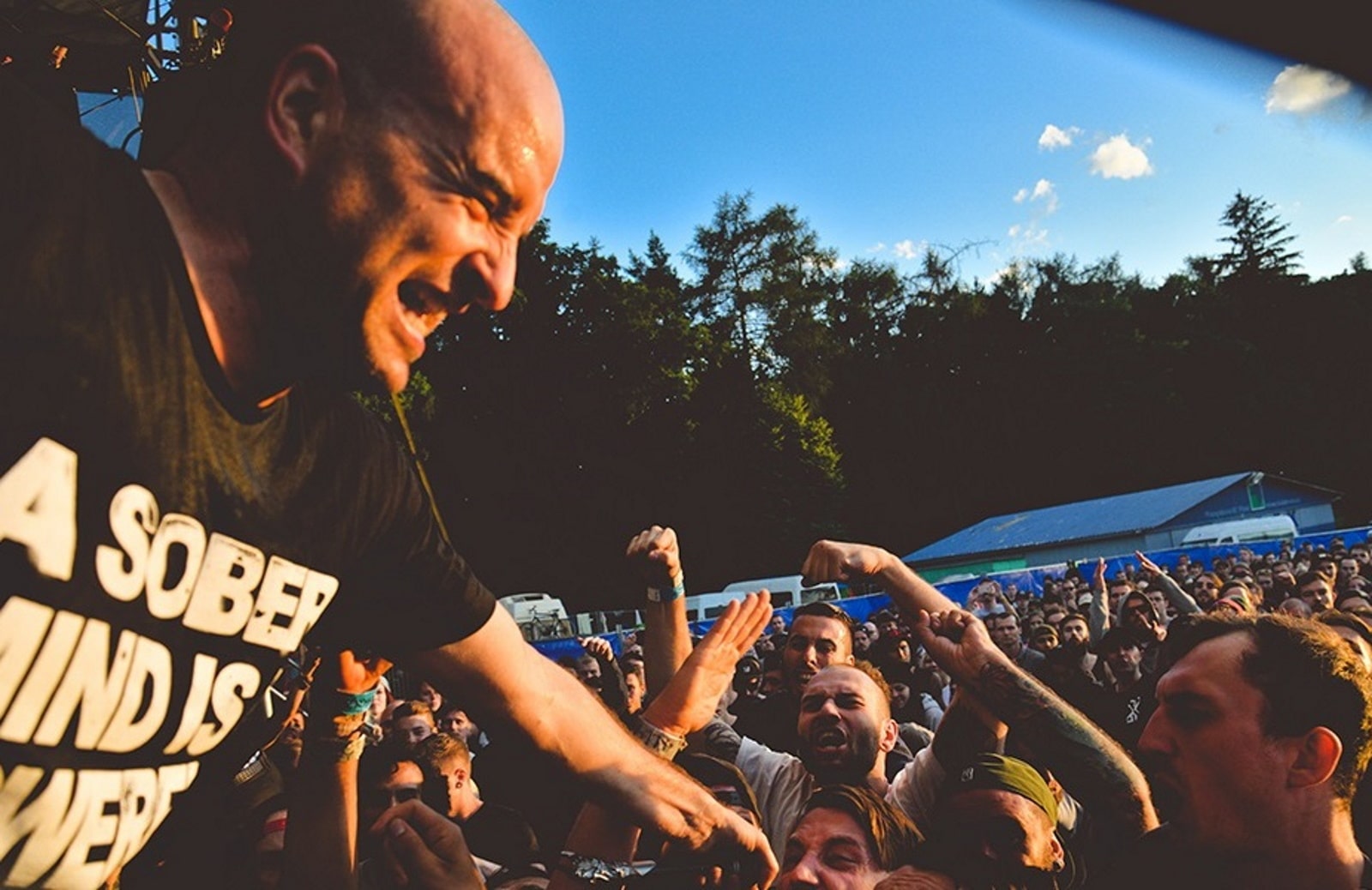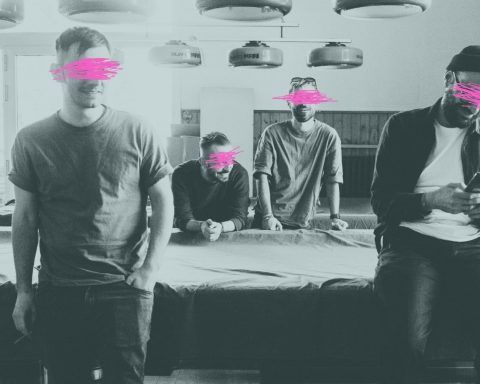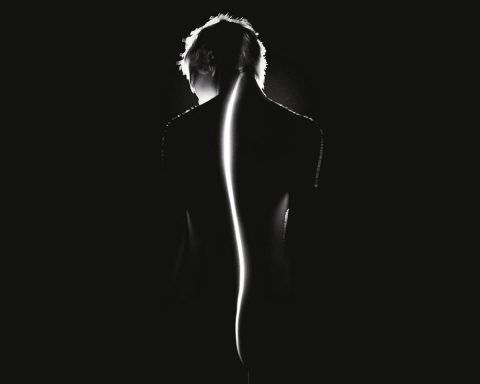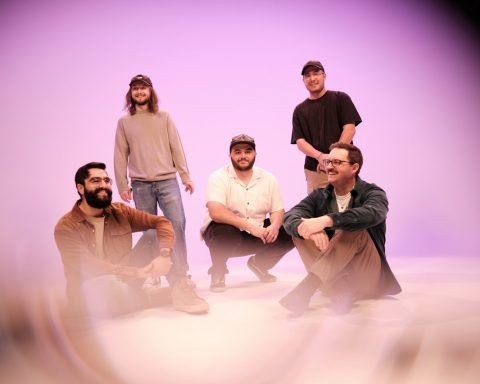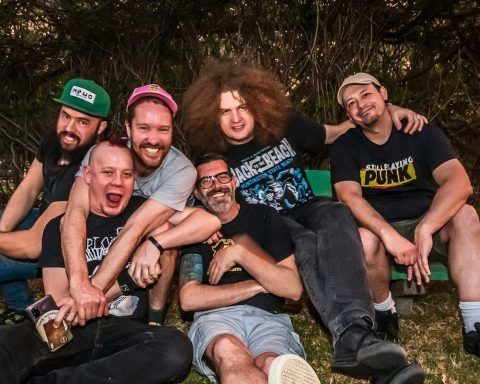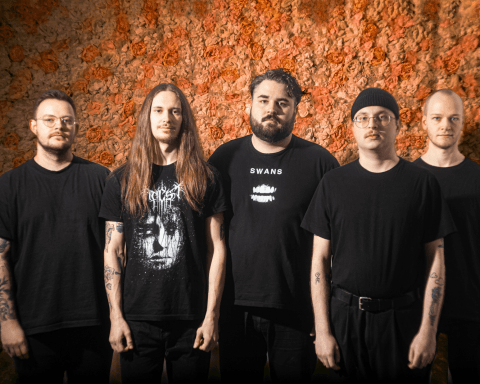In the clamorous labyrinth of New York’s hardcore scene, Blackout! Records, has held a steady beacon since its inception in 1989. Founded by Bill Wilson and Jim Gibson, the label, with a reputation built on the raw energy of acts such as Killing Time, Deadguy, and Sheer Terror, has been home to an enfilade of music that defined a generation. Yet, with vinyl reissues and exclusive releases scheduled from now through 2024, the label signals a dynamic rebirth, promising to weave old threads with new in a tapestry that captures the enduring spirit of hardcore.
In our newest interview below, Wilson recalls the early days of the label with striking clarity. “The label started organically sometime in 1988 through the local indie record stores in suburban NYC,” he shares. “We wanted to release bands that we felt were under-represented or overlooked by the growing straight edge/youth crew clique.” With an eye for talent and a finger on the pulse of the hardcore scene, Blackout! Records quickly became the launchpad for a slew of bands that continue to be revered.
The landmark release of “New York Hardcore: Where The Wild Things Are…”, the label’s first offering, gave an unsuspecting audience a taste of the raw, unbridled energy that the hardcore scene of NYC had to offer. “Jim and I just wanted it to be a snapshot of late 80’s NYHC,” says Wilson. And indeed, the compilation went on to become a classic, encapsulating the essence of the late 80s hardcore scene, a sonic time capsule resonating even today.
“The fact that ‘Where The Wild Things Are..‘ influenced (and continues to influence) generations of kids all over the world always brings a smile to my face because my friend Jim and I did it. We actually did it.” – Bill Wilson.
The new phase in the label’s journey marks the joining of forces with Symphonic Distribution, a move expected to rejuvenate Blackout! Records’ broad catalog and herald a series of fresh collaborations. The first wave of vinyl reissues, featuring three titles from the NYHC stalwarts, Sheer Terror, exemplifies the label’s commitment to preserving its rich history while steering the ship into the future.
As Wilson elucidates, “It’s really demand-based. Killing Time, Kill Your Idols, Deadguy, Sheer Terror, Powerhouse OBHC, and H2O are all still actively playing shows. People want the music on vinyl. So it’s a good base for us to build on.”
Much has transpired since the label’s nascent days. From Jim Gibson’s departure to start Noiseville Records, to Blackout!’s foray into more commercial music with H2O’s debut album in 1996, and the subsequent years of online presence without new music, each phase brought its unique set of challenges and triumphs.
In charting the path forward, Wilson offers a glimpse into the label’s vision for the future. “We’re just gonna do our thing, and work with bands we like. There’s a huge advantage because at this point in my life I don’t rely on the label to pay the bills, and I can put everything back into making it sustainable.”
“Understanding your scene is the most critical. Having a degree of emotional intelligence is also critical. It also makes sense to understand that although it’s ‘punk,’ understanding the business aspect is more important than ever in a digital world. You need to know how it all really works.” – Bill Wilson on advice for upcoming independent record labels.
From the echo of the past, through the hum of the present, to the melody of the future, Blackout! Records weaves a tapestry of hardcore music that continues to define and be defined by its era. Join us as we delve into a conversation with Bill Wilson, who offers a candid perspective on the journey so far, and a tantalizing preview of the road ahead.
As you reflect on the inception of Blackout! Records back in 1988, what drove you and Jim Gibson to create a platform for the NYC hardcore scene? What gaps were you hoping to fill?
The label started organically sometime in 1988 through the local indie record stores in suburban NYC. There wasn’t some elaborate plan behind starting the label . Both Jim and I wanted to release bands that we felt were under-represented or overlooked by the growing straight edge/ youth crew clique, So we pooled our money and put together V/A NYHC:Where The Wild Things Are …
It also helped that Carl (one of the founding members of Breakdown and Killing Time) was a close friend since we were toddlers. It gave me a little leg up on having those bands being “anchors” for the comp.
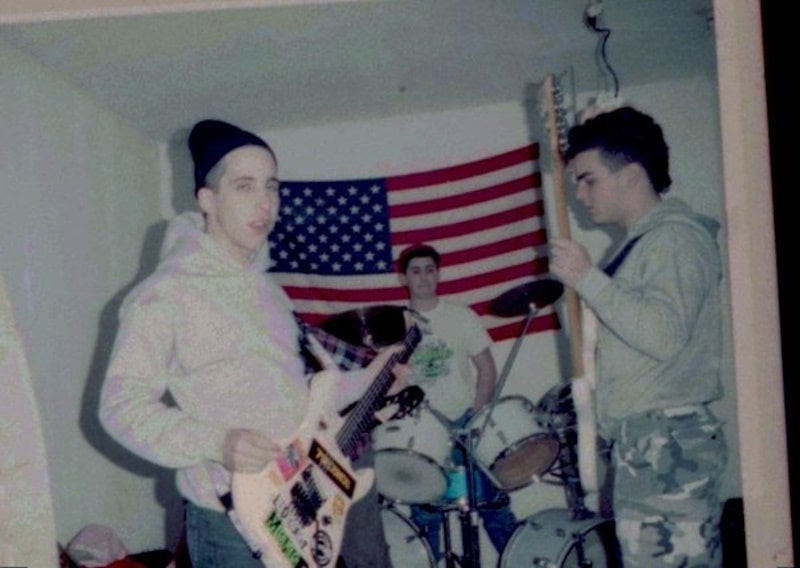
Can you share some stories behind the first release, “New York Hardcore: Where The Wild Things Are…”? How did it feel when it became one of the most recognized compilations in NYHC history?
This probably sounds like an old man yelling at the sky, but it wasn’t easy to put out a record back in those days. Layouts were done analog, without a computer, and there wasn’t any real information out there on what to do. Luckily, I found a book called “How To Make And Sell Your Own Record” at a zine store downtown and it became my bible. From the store, Jim knew some people at distributors, so we were able to finagle some info out of them.
We definitely didn’t have any wild expectations for the comp. We knew most of the bands (Breakdown, Killing Time, Sheer Terror, Outburst, GB) already had followings in the scene, but Jim and I just wanted it to be a snapshot of late 80’s NYHC. We wanted to pretty much make our money back, and have something cool as an audio yearbook of sorts. We could only hope it would be remembered in the same breath as comps we loved like ROIR NY Thrash, or Big City’s One Big Crowd.
The success was like a miracle, and overwhelming to us, because we were still kinda winging it and acting on impulse. Local stores up and down the east coast couldn’t keep it in stock. Distributors were putting it in indie stores around the world.The fact that Where The Wild Things Are.. influenced (and continues to influence) generations of kids all over the world always brings a smile to my face because my friend Jim and I did it. We actually did it.
After Jim Gibson parted ways to start Noiseville Records, what challenges did you face in steering Blackout! Records on your own?
Jim had different taste in music than I did. He wanted to move in his own creative direction, and release more experimental/ noise records. I pretty much stuck with hardcore. He and I stayed close and were always sharing information. We collaborated a few years later on a pressing of the Breakdown Demo 7”. As far as challenges, I had the design skills, computer skills, and learned the business aspect pretty quickly so I didn’t have too many roadblocks doing it all myself.
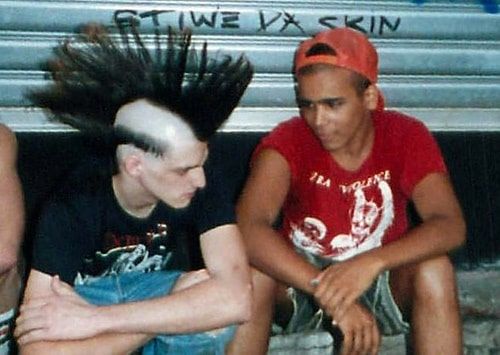
How did the shift in the local hardcore scene, especially the increased violence, affect Blackout! Records and its bands during the early 1990s? How did this climate inspire the creation of Engine Records?
It seems weird for a guy who released albums by some notoriously “angry” bands to eschew the violence, but it got out of hand. Anthony from Killing Time used to joke all the time, “Hey I went to a brawl and Killing Time played.” To me, the early 90’s were a turning point for HC.
Smaller scenes were cropping up in Long Island, NY and New Brunswick, NJ and other places. Half the scene “left” CB’s behind and started going to more shows at ABC No Rio. Plus I was living in NYC at the time and the indie rock explosion was happening- Helmet, The Unsane, Pavement, Jon Spencer, Matador Records, etc. . It seemed that’s where the creativity was happening. Plus, the “night” shows at CB’s had a much better male-to-female ratio than a matinee filled with a bunch of shirtless dudes trading punches.
Engine came about serendipitously. For my day job, I ran a heavy metal label called Earache Records (Sleep, Napalm Death, Entombed, AC) and we shared an office space with my good friend Steve Martin and his company Nasty Little Man PR. On any given day, I could walk into my office and “interrupt” Mike D from the Beastie Boys using my computer to send emails, or see Billy and the Smashing Pumpkins in the back corner talking to Matt Sweeney, one of the PR people there at the time. Then there was the time Entombed met The New Bomb Turks…. Anyway Sweeney got hipped to Guided By Voices early on, he was always pushing me away from cookie cutter hardcore and into new things. So, he introduced me to Robert Pollard and they gave me a few tracks to release on an EP called Fast Japanese Spin Cycle. That imprint allowed me to explore new music and more diverse new sounds.
Amazing. So your venture into more commercial music with H2O’s debut album in 1996 was a significant turning point for Blackout! Records. Can you share the story behind this transition and how it impacted the label?
There (again) was no grand strategy and nobody was engineering some sort of creative shift. HC/ Punk encompasses a lot of sounds and styles. I like 7 Seconds, Bad Religion and Rancid just as much as I like the Bad Brains, Agnostic Front, and Minor Threat. Simply put, I was just friends with all of these guys from hanging out. I had released Todd Morse’s (Toby’s brother) band, Outcrowd, on Blackout! so there was already a level of trust there. I was always hanging out in crazy art spaces in Hoboken and Jersey City with their whole crew. So, when Toby started H2O, It kind of happened on its own.
With respect to impact, it’s by far and away our most commercially successful record.
Blackout! Records and other independent labels like Victory Records, Indecision Records, and Nitro Records have played a crucial role in the hardcore punk scene since the mid-’90s. How do you see the contributions of these labels evolving with the changing music landscape?
We all had moments in the sun, where we captured the hearts and minds of our peers in the scene. I think the unifying thread is that we all actually felt “something” about the bands we were doing and believed in them. The same can be said for AmRep, SubPop, Touch& Go, Quarterstick, Merge, Dischord, etc.
The early 2000s brought some fresh talent to Blackout! Records. Could you tell us about how you discovered these new bands and what you believe they brought to the label’s identity?
The label has always been more of an outlet for my expanding taste in music. People know us for what we did, but once you have Sheer Terror- do you need a thousand sound-alike bands that pale in comparison?
Kill Your Idols signed with us in the late 90’s. For me they symbolized a return to the hardcore sound that got me into the scene in the first place.
Heavy punk influence with a tinge of melody as opposed to the cookie monster vocals and chugga chugga beatdown parts. Crime In Stereo, also from Long Island, were another departure- a bit more experimental and would have also been a fit on a label like Jade Tree.
The Commercials from PA were probably the biggest creative departure for us. They were extremely emo-pop in sound, but I thought Andy’s voice was stellar and in my head I saw no reason they couldn’t walk a similar path as the early Fueled by Ramen bands.
After the last official Blackout! release in 2005, the label maintained an online presence without releasing new music for some years. Can you explain this decision and what it meant for the label?
After The Fire Still Burns record, we had a very bad breakup with a thieving, insidious business partner and other partners who I felt betrayed by. After that, I wanted no part of anything for years. So I put all the stuff up digitally and destroyed all the physical product. It took years to even think this could ever be fun again. I concentrated on my career in other aspects of music industry, and spent as little time on Blackout! as I could.
Fences eventually got mended with the other partners, and then a friend of mine and I put together the Sheer Terror reunion video documentary/ concert film. But it was released on DVD by Thorp Records. I still wanted no part of CD’s, vinyl, or anything.
The 2016 release of “The Bulldog Box” marked a return from hibernation for Blackout! Records. Can you share the motivation behind this comeback and the audience’s reaction?
I had come to terms with what the label was, where it went wrong, and still felt that something was left undone. I was still friends with the guys in Sheer Terror and I was itching to do the art and layout for a box. (That’s the fun part for me.) So I put together the Bulldog box with all the cool inserts and bonuses, and sold them directly via a crowdfunding campaign on PledgeMusic. The reaction was overwhelmingly positive, as the wax was unavailable for years. It got me thinking about how vinyl was coming back, and how much of a shame it was that some of these great records were unavailable.
In 2019 and 2020, Blackout! Records announced expanded vinyl reissues and the release of Outburst’s “Miles To Go.” How did you navigate these plans amidst the Covid-19 pandemic?
I have some health issues, so I needed to stay very frosty during the pandemic. I had a lot of indoor time on my hands. So I used that time to put together the OB reissue and assemble a comp of newer bands doing Outburst covers called Hot Shit Attitude.
Bands like Krimewatch, Higher Power and the mighty Power Trip all contributed. The supply chain issues with getting vinyl made were a bummer, and set our schedule back over a year- but since there was nobody breathing down our necks to get it out, it was ultimately fine.
As Blackout! Records prepares to make a grand return with vinyl reissues and exclusive releases, what vision do you have for the label’s future?
We still have a catalog to release on wax, maybe including a super deluxe Where The Wild Things Are… release. I’m also considering going out and finding other old-school records in need of a repress, and maybe even a new band or two. Seeing what Flatspot and BBB are doing is actually inspirational for me.
Having recently joined forces with Symphonic Distribution, what can fans expect from this collaboration in terms of rejuvenating Blackout! Records’ broad catalog?
Symphonic is a truly forward-thinking distributor. I like their whole vibe and the people that work there from the top down. I believe they will play a more active role in finding opportunities for the catalog on DSP playlists, game/ TV/film sync, etc. The goal is keeping the music alive for generations to come.
Looking at your upcoming vinyl releases, starting with three titles from Sheer Terror, what is your strategy for choosing which records to reissue?
It’s really demand-based. Killing Time, Kill Your Idols, Deadguy, Sheer Terror, Powerhouse OBHC, and H2O are all still actively playing shows. Crime In Stereo is starting to gig live again. People want the music on vinyl. So it’s a good base for us to build on.
As Blackout! Records continues to make its mark, how do you see the label’s role in shaping the hardcore punk scene in the coming years?
We’re just gonna do our thing, and work with bands we like. I’d love to find a band or two that could have a similar impact to what our most successful bands did in the past. There’s a huge advantage because at this point in my life I don’t rely on the label to pay the bills, and I can put everything back into making it sustainable.
What advice would you give to upcoming independent record labels looking to make a mark in their respective genres?
I take my lessons from all the successful labels that I looked up to as a kid. Understanding your scene is the most critical. Having a degree of emotional intelligence is also critical.
It also makes sense to understand that although it’s “punk”, understanding the business aspect is more important than ever in a digital world. You need to know how it all really works. I’d also say that there will be plenty of shit-talkers who a decade later will be sitting on the same barstool, yammering on about their big plans that will never come to fruition. Fuck them.
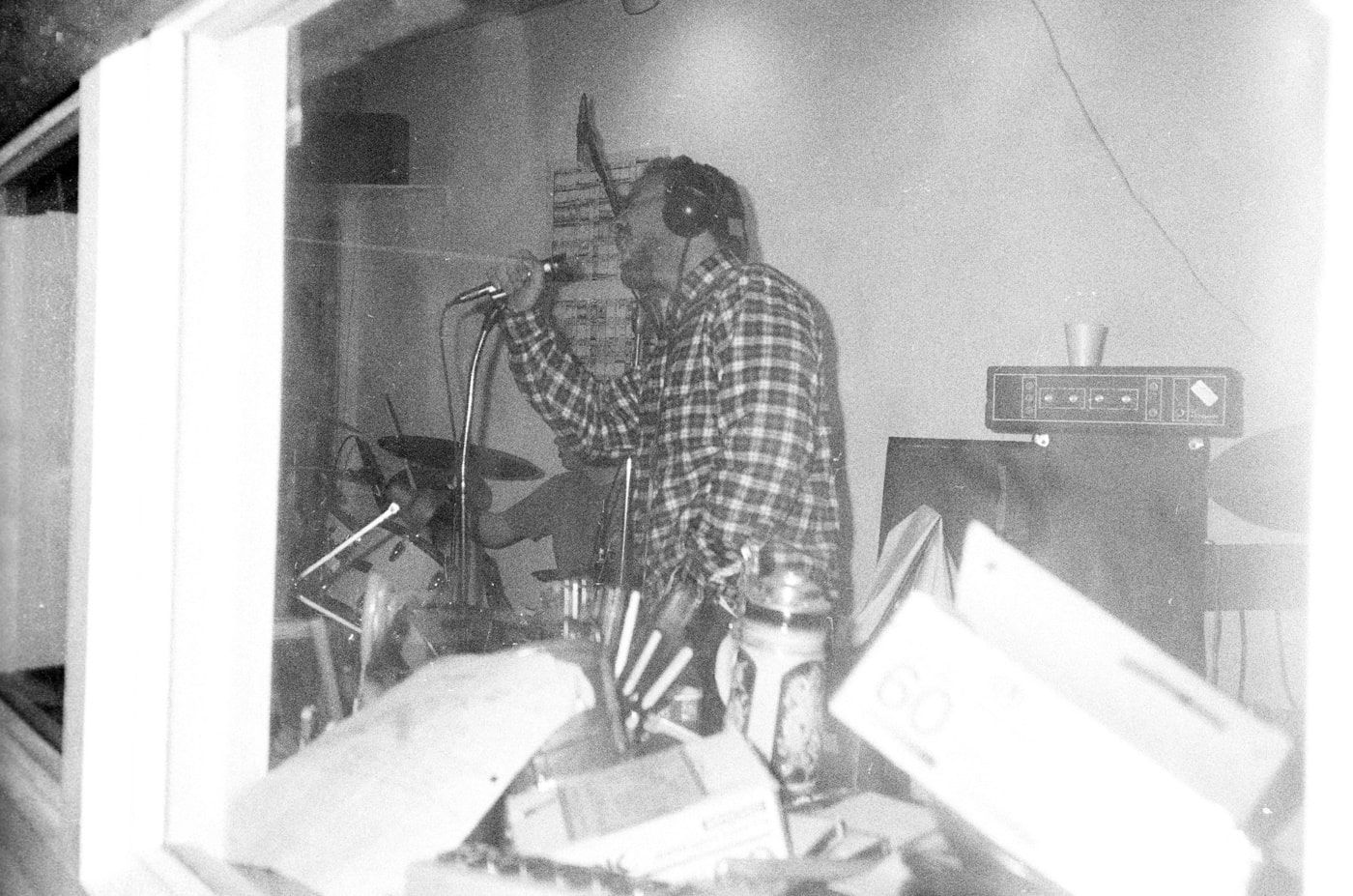
Looking back at the journey so far, which moments would you consider as the most defining for Blackout! Records and why?
For me it’s all about cultural impact. So the release of V/A NYHC: Where The Wild Things Are, Sheer Terror “Just Can’t Hate Enough”, Breakdown “‘87 Demo”, H2O S/T and Kill Your Idols “This is Just The Beginning” were defining moments for the “company”.
For me personally it’s all about the road stories, those things money can’t buy and about people, not records. Going across the country on the Let’s Go Tour with Rancid and The Goops. skinny dipping in the Gulf Of Mexico (and in shark-infested SF bay.) Sleeping in the (real) Picasso bedroom at a very famous person’s house, pulling a Large Marge and scaring the fuck out of Kill Your Idols in the New Mexico desert at 110 mph. Those are the moments I never documented with snapshots but those who know, know and that’s good enough for this GenX’r.
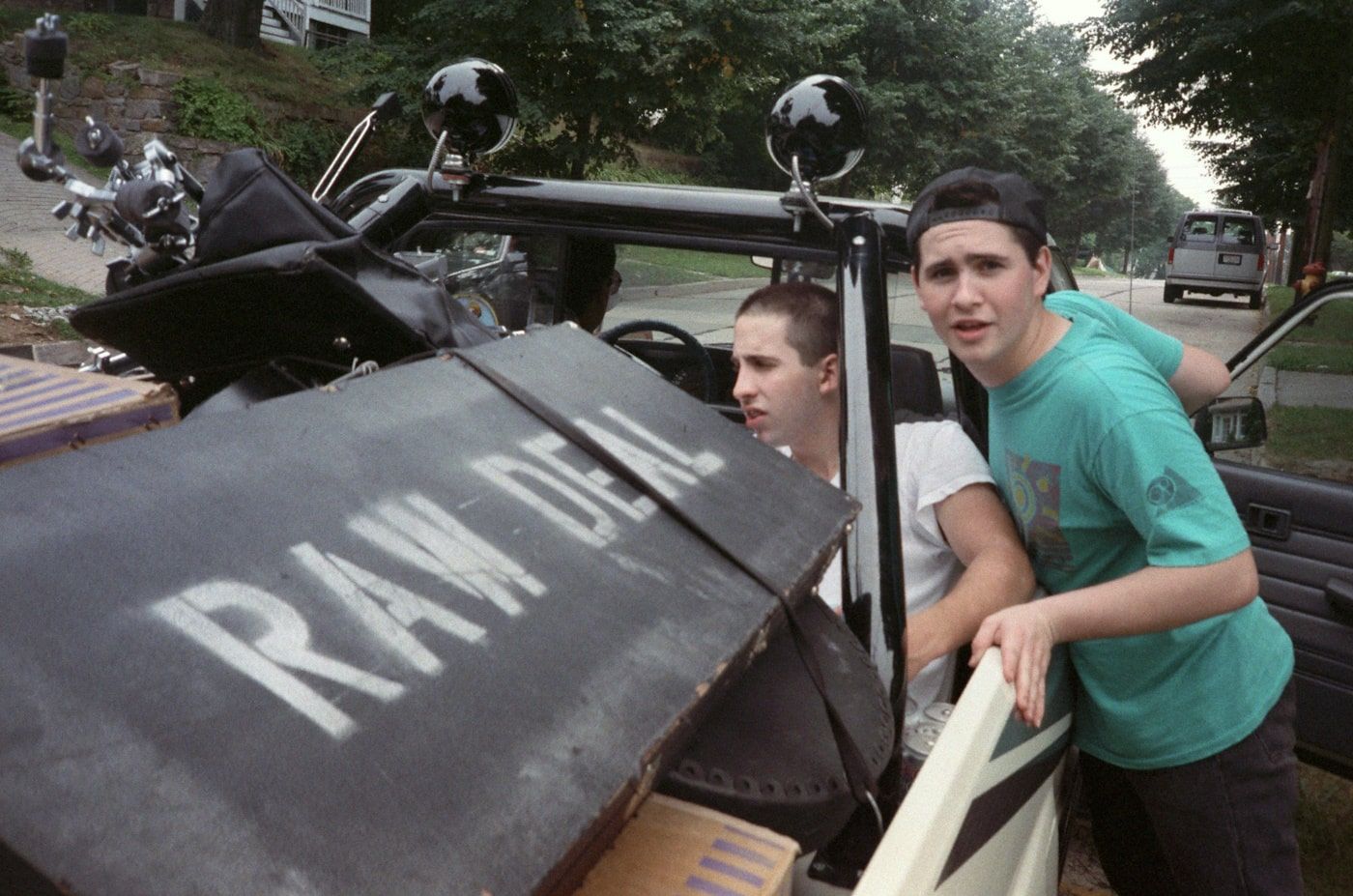
Are there any specific albums or bands you wish Blackout! Records had had the opportunity to work with?
I have a list, but ultimately if it didn’t work out, it was for a reason. More often than not, and with the perspective of 20/20 hindsight, it was all for the better.
Can you tell us about any upcoming projects or releases that fans should keep an eye out for?
Upcoming releases include two more Sheer Terror catalog albums, Three Kill Your Idols albums, Crime In Stereo “Explosives and the Will To Use Them” (never before on vinyl), Punk Rock Jukebox I and II and maybe some new bands or surprise reissues. We really try not to hype anything before we know it’s real so the best thing to do is keep an eye on our socials.
As we conclude this oral history, how would you like Blackout! Records to be remembered in the annals of hardcore punk?
Our music wasn’t just vapid, fleeting entertainment. Blackout! and our bands gave “the kids” a constructive outlet for their anger, a way to exorcize their trauma, and/or provide a sense of community they may never have felt elsewhere.



